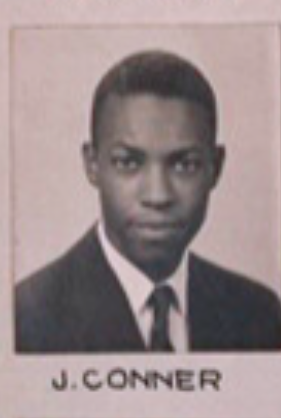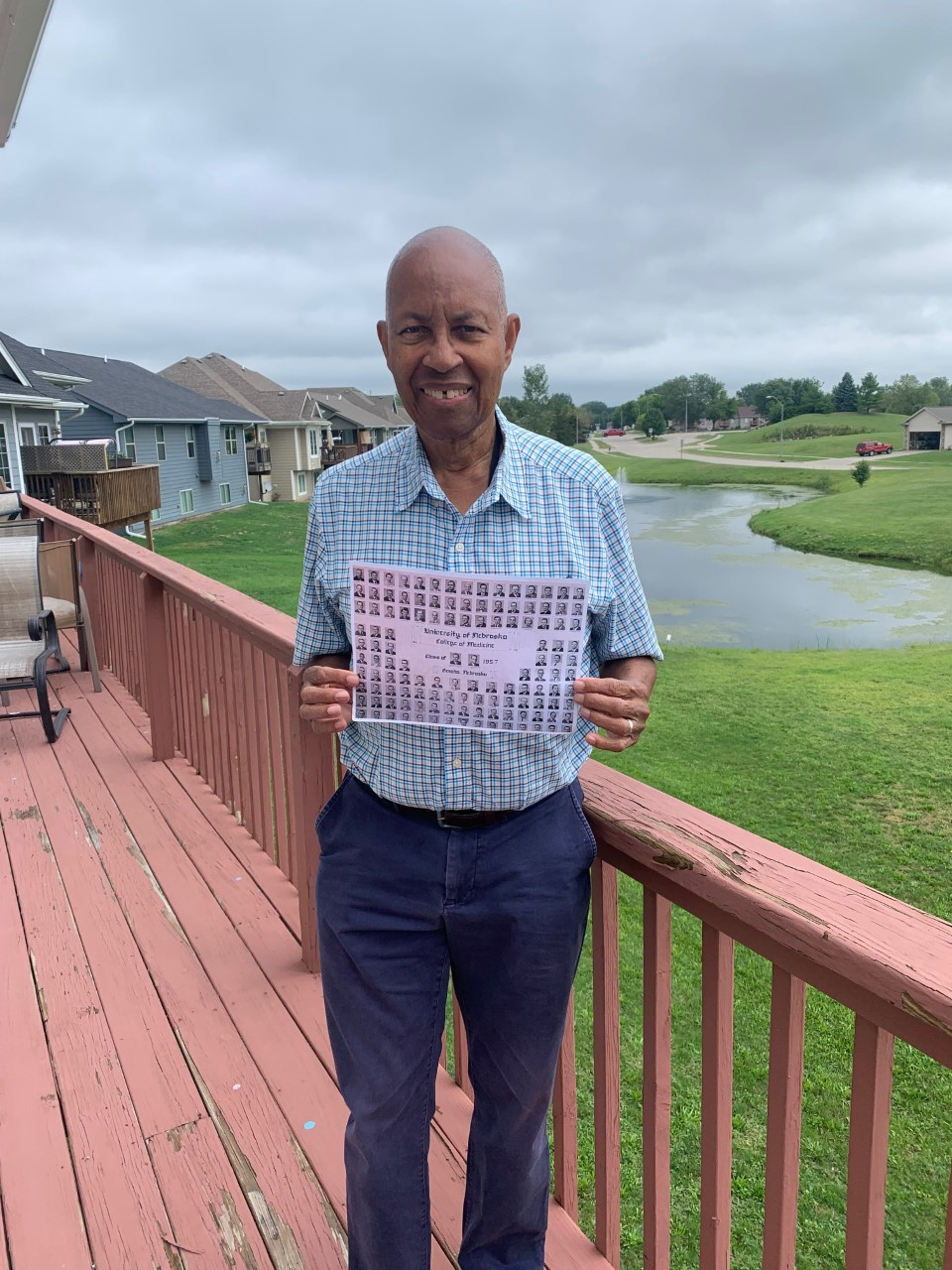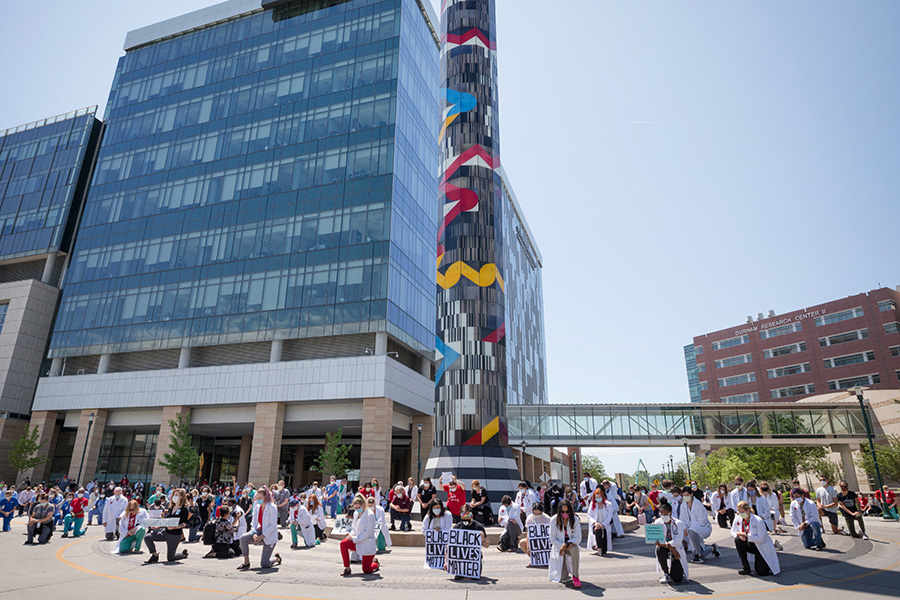Notable Alumni - Dr. Julius Conner

Walking Tour Survey
Please complete this survey before you begin the tour

In April 2020 and September 2021, the Leon S. McGoogan Health Sciences Library, interviewed Dr. Julius S. Conner, a 1957 graduate of the University of Nebraska College of Medicine. Dr. Conner is one of the first African Americans to graduate from the College of Medicine in the twentieth century. Dr. Conner subsequently received a Master of Public Health degree from Harvard University in 1964. He worked as the Public Health Director for the Polk County Public Health Department.
“My dad was always interested in medicine.”
Dr. Conner’s parents were born and raised in Mississippi. In Mississippi, Mr. Conner had been a Pullman Porter. Pullman Porters worked as porters for the railroad on Pullman sleeper cars. The Pullman Porters were an exclusively African American workforce until the 1960s. The position offered African American men and their families a chance at economic stability. Omaha was a stop on Mr. Conner’s railroad route and he heard the city offered African Americans children a chance for better education than they could expect in the American South. In the 1930s, Dr. Conner’s parents decided to relocate to Omaha to raise their family.
Growing up in the Near North Side
Dr. Conner was born in Omaha in 1934 at the County Hospital. His family lived at 1915 North 27th Street in Omaha’s Near North Side, a historically African American neighborhood. Dr. Conner remembers several African American physicians serving the medical needs of the African American community, including those of his family. Dr. Conner believed the African American physicians he knew in his youth trained outside of Nebraska, in historically black colleges, like Meharry or Howard University on the east coast.
Dr. Conner’s father changed careers after moving to Omaha. Mr. Conner became a cement finisher. In the summers, Dr. Conner worked with his dad. Dr. Conner chuckled when he recalled, "I liked the work and, at the time, I thought I wouldn’t mind following him into the trade.” His father, however, had bigger dreams for his son. Dr. Conner said, “My dad had always wanted to be a doctor.” He encouraged Julius to pursue a career medicine. “Well, it was something that my dad wanted to do, and he wanted us to do it since he wasn't able to do it. But I—I liked it too and I was glad that I had the opportunity to do it so I could learn more about the human body and also I could tell my dad what I was doing and what I was learning about.”
Education
Dr. Conner attended Long Elementary and Central High School in Omaha. He received his undergraduate degree from Omaha University (now University of Nebraska Omaha) in 1954. He reflected that while his family had little money, “university tuition was low back then.” He attended the University of Nebraska Medical College, graduating in 1957. Dr. Conner was the only African American to graduate in 1957 and was one of the first African Americans to graduate from the College of Medicine in the 20th century. In 1964, Dr. Conner graduated from Harvard University’s T.H. Chan School of Public Health with a master’s degree in Public Health.
Dr. A.B. Pittman
Dr. Conner worked part-time for Dr. A.B. Pittman for the first two-and-a-half years of medical school. Dr. A.B. Pittman was a a well-regarded African American veterinarian in Omaha. He operated Pittman’s Animal Hospital located at 4629 Dodge St. The position offered Dr. Conner needed income as well as free housing close to the UNMC campus. Dr. Conner lived at the Pittman Animal Hospital and worked as the night watchman. If a travelling pet owner needed to bring in or pick up an animal after hours, Dr. Conner would assist them.
Dr. Conner’s Medical School Experience
Dr. Conner’s favorite memories of the College of Medicine include, “meeting some of the other students and working together in small groups, clinically. There would be four or five students on a rotation together for a few months. That was enjoyable. I didn’t really have a lot of time outside of school and study.” Like him, many of his fellow students, he said, “I wanted to stay at the hospital as long there were patients to see. Hopefully, patients didn’t mind being seen!”
For the second two years of medical school, Dr. Conner was assigned to a clinical location. For most of that time, he rotated with the Conner’s African American family doctor. He noted that he worked with his family doctor, “even for OBGYN and Urology.”
Dr. Conner was the only African American student enrolled at the University of Nebraska College of Medicine in 1954. By his third year, Dr. John Burkhardt (‘59) an African American student originally from North Carolina had enrolled. African American students from Omaha were however attending Creighton University’s College of Medicine at that time. Dr. Conner recalled participating in a Creighton and Nebraska African American medical student group reported on page 12 of the September 30,1955 issue of the Omaha Star. In his recollection, the purpose of the group was to get other young people involved in medicine.
Dr. Conner stayed in contact with the African American men from Central and the Community pursuing medical degrees. The peer support network this provided was, “very helpful” to Dr. Conner. He said, “Occasionally we would—we would study together, but mostly it was just telephone talk, back and—back and forth.” If we were on the special thing and had a special patient with whatever the patient had, I would call and say, ‘Have you seen a patient with this and how did they treat it?’ Things like that we would do.”
Intern Year & the Kappa Alpha Psi Network
Dr. Conner struggled as an African American to secure an internship after medical school, particularly locally. He said, “As a Black doctor, options were limited; a Black medical student typically had to intern at Black hospitals like Meharry and Howard.” He recalled the stress and frustration he felt at that juncture in his medical training. Dr. Conner reached out to more than 25 programs for his internship and finally found one in Des Moines with the help of his fraternity, Kappa Alpha Psi, a historically African American society. Through Kappa Alpha Psi, he connected with several doctors outside of Nebraska. One of those African American doctors was Dr. Scales, a prominent physician in Des Moines, Iowa.
Dr. Conner was relieved when Dr. Scales helped him find an internship at Mercy Hospital in Des Moines. Dr. Scales served as the hospital chief of Mercy Hospital. Dr. Conner said, “Fortunately, he was able to convince medical staff and hospital administration to accept me for my internship.” Dr. Scales, he stated, “had to convince the white nuns, administration and doctors, and priests that it would be okay.” Dr. Conner completed a one-year internship at Mercy Hospital.
Residency Program in Des Moines
Dr. Conner decided to stay in Des Moines for residency. He completed a two-year pediatric residency at Des Moines’ Raymond Blank Memorial Hospital for Children. He recalled, “There was a pediatric residency program in Omaha, but I decided to stay in pediatrics in Iowa. The [Blank] Hospital residency program helped supply doctors in Des Moines. That worked out very well.”
After residency, Dr. Conner spent one year in Washington D.C. working with Roland B. Scott, a renowned sickle cell researcher at Howard University Medical School. He appreciated the mentorship in Washington, DC as well as the support of other Black pediatricians in the area, of which there were many.
The Conner family returned to Des Moines from Washington, DC. Dr Conner’s wife, Salina Gilreath Conner, was a teacher and had no trouble finding a job with the Des Moines Public Schools.
After one year in private practice in Des Moines, Dr. Conner became the Assistant Health Director of Public Health for the Des Moines-Polk County Health Department in 1961. He felt drawn to public health because he believed he could make a significant impact on public well-being. Dr. Conner once told a reporter for the Des Moines Bystander, “In one year as a practicing physician I gave 100 shots for measles, in one year as an administrator I can see that 1,000 shots are given.” delivered His work hours were also more compatible with the demands of his young family and allowed him to support his wife’s career as a teacher. In 1963, he took a leave of absence to enroll in a Master of Public Health program at the T.H. Chan School of Public Health at Harvard University in Cambridge, Massachusetts. Upon graduation, he returned and was appointed Director of Public Health. Dr. Conner served as President of the Iowa Health Association and a Trustee for the U.S. Conference of City and County Health Offices. His medical research has been published in numerous medical society journals. He was involved with Des Moines’ pediatric residency program. He also served on the board of the nursing program. In 2000, Dr. Conner received the Martin Luther King, Jr. Lifetime Achievement Award from the State of Iowa.
-Emily Brush JD


Walking Tour Welcome
Combating Racism in Medicine